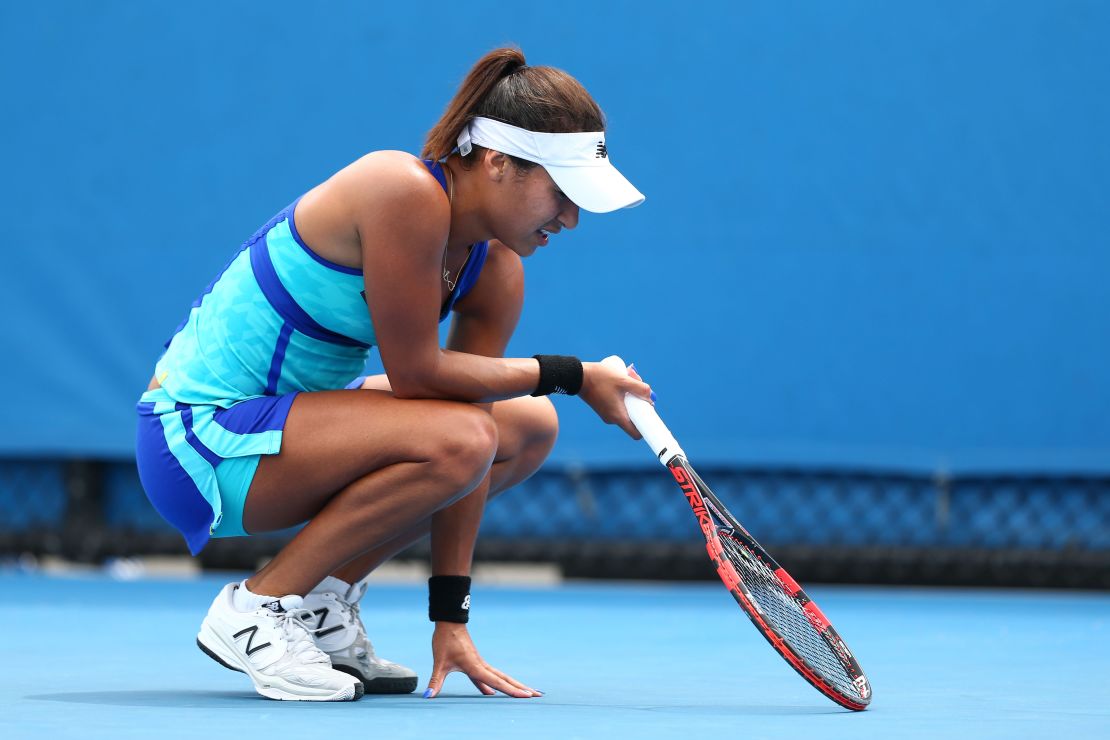Editor’s Note: This article was originally published in January, 2015
Story highlights
British player Heather Watson loses match due to 'girl things'
Sparks global debate about whether menstruation is sport's 'last taboo'
Openness applauded by some, others concerned it could damage equality
How much information is too much information? When British tennis player Heather Watson said in a post-match interview that she lost her Australian Open round due to “girl things,” she sparked a debate about menstruation that quickly spread across the world.
“Has sport’s last taboo been broken?” wondered commentators, after the 22-year-old described feeling “light-headed” and “low on energy,” putting it down to her period.
“We talk about sex quite openly, we talk about breast enlargements, we talk about so many things that people don’t even bat an eyelid about these days,” former British number one tennis player, Annabel Croft, told CNN.
“Yet this particular subject never gets discussed. And I can understand why – it’s a bit uncomfortable viewing isn’t it?” said the founder of her own line of leak-proof underwear called “Diary Doll.”
“But the fact that Heather said what she said in a very innocent, charming way, I think it made people think ‘wow’ this does happen to athletes at that particular time of the month.”
With the world’s media scrutinizing their every move, it often feels as though nothing is out of bounds when discussing the physical and mental conditions of elite athletes.
Indeed, Argentine footballer Javier Mascherano didn’t bat an eyelid as he told reporters he’d torn his anus in a goal-saving stretch during last year’s World Cup. While English cricketer Michael Yardy flew home early from an international tour in 2011, revealing he was suffering depression.
“Women’s business”
So why the silence when it comes to a fact of nature that affects most female athletes – and in Watson’s case apparently influenced the outcome of her match?
“Even grown women in the office, when they make the walk from their cubicle to the bathroom discreetly tuck a tampon or pad up their sleeve or decide whether to carry their purse with them – not to hide the blood itself, but the fact that they’re bleeding,” Karen Houppert, author of “The Curse: Confronting the Last Unmentionable Taboo, Menstruation,” told CNN.
She said the secrecy was partly to do with workplaces historically being “men’s spaces,” which women have adapted to.
“I think it’s also linked to sexuality in ways that makes people feel uncomfortable,” Houppert added.
“Girl things”
While Houppert supported Watson’s candor, she said describing menstruation as “girl things” perpetuated a culture of concealment.
“I wish she could have just been direct about it, because I think that adds to the weirdness surrounding this topic,” said Houppert.
“Our history of talking about menstruation is really full of euphemisms that people have used for centuries: Wrong time of the month; Communists in the summer house; The misery; Under the weather; Weeping wound; Package of troubles.”

Could the British number one tennis player have actually set back feminism in the sports arena by bringing up her period in the first place?
“It’s potentially problematic for women because our periods can get used against us,” said Houppert.
“It’s easy to dismiss a woman as ‘oh she’s on her rags’ if someone is angry or emotional. It’s a way of discounting the validity of what a woman is saying.”
Professional cyclist, Inga Thompson, said there was a fine line between openness and undermining women’s sporting abilities.
“I feel very protective of our sport. You don’t want to pull the ‘girl card,’ because we’ve fought so hard for equal representation,” she told CNN.
“It’s true that the day before or the day after I started my period, I was a little weaker. Was I ever so weak that I felt I lost a race because of it? No.”
In Croft’s case, she once felt so dizzy from her period she had to walk away from a Grand Slam match – “I didn’t feel like I could talk about why I had to do this. Like so many female athletes I suffered in silence,” she said.
Man up?
Every woman is different and menstruation needn’t be the deciding factor on the playing field. After all, British runner Paula Radcliffe told the BBC? she had her period when she broke the world record at the Chicago Marathon in 2002.
In some cases, professional cyclists naturally miss periods due to low body weight, said Thompson. ?
On the tennis circuit, players sometimes take the pill to skip their period during a major competition said Croft, who recalled the immense pressure of playing at Wimbledon in a white skirt, with her period, and the world’s camera lenses trained on her every move.
“It’s a nightmare, particularly because the skirts are flapping up in the wind the whole time and you definitely don’t want to have an accident,” she said.
“There is only one toilet break a set – and matches can go on a long time!”
Breaking the cycle
So does that mean Watson has heralded a new era of openness among female athletes?
“What she has done is open up a world debate, and I think it will be easier to talk about it in the future because that subject has been broached now. I think it’s been quite groundbreaking,” said Croft.
“But whether or not a journalist is brave enough in a press conference to ask: ‘Did you lose today because you had your period?’ I’m not sure if that’s ever going to be the case.”
Insight: Bouchard stays calm over tennis ‘Twirlgate’
Big interview: Goolagong – ‘Sunshine Super Girl’ who defied prejudice






